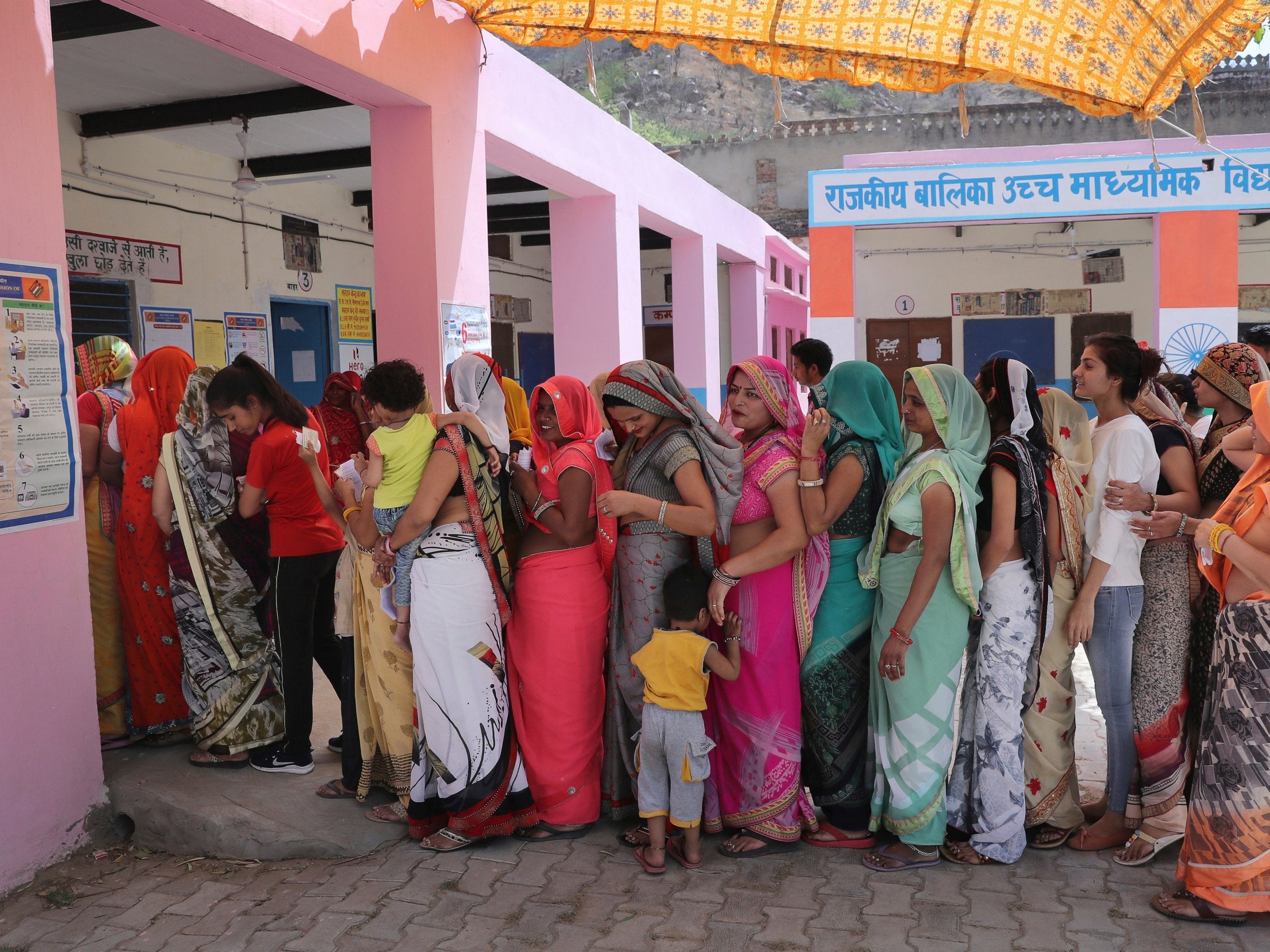India election: Gandhis face stern reelection test as country goes to polls for fifth phase
Seat controlled by Nehru-Gandhi family for generations but grip is slipping, says BJP

Your support helps us to tell the story
From reproductive rights to climate change to Big Tech, The Independent is on the ground when the story is developing. Whether it's investigating the financials of Elon Musk's pro-Trump PAC or producing our latest documentary, 'The A Word', which shines a light on the American women fighting for reproductive rights, we know how important it is to parse out the facts from the messaging.
At such a critical moment in US history, we need reporters on the ground. Your donation allows us to keep sending journalists to speak to both sides of the story.
The Independent is trusted by Americans across the entire political spectrum. And unlike many other quality news outlets, we choose not to lock Americans out of our reporting and analysis with paywalls. We believe quality journalism should be available to everyone, paid for by those who can afford it.
Your support makes all the difference.Indians voted on Monday in seats being contested by some of the country’s most heavyweight political leaders, as a mammoth six-week general election entered its final stages.
At the close of polling, 400 out of the 543 parliamentary seats up for grabs in the election will have been decided, with only two more phases of voting to come.
In Uttar Pradesh alone, 25 million people were registered to vote on Monday for 14 members of the Lok Sabha, the lower house of parliament. The state is the most populous and offers the greatest number of seats for parties contesting the election.
And while victories across rural heartlands in Uttar Pradesh were the driving force behind Narendra Modi’s sweeping 2014 victory, the state includes two seats that can be counted among the strongest bastions for the opposition Congress party.
Congress leader Rahul Gandhi is seeking a fourth consecutive election in the seat of Amethi, while his mother Sonia Gandhi is running in neighbouring Rae Bareli. Priyanka Gandhi Vadra, Rahul’s sister, recently entered politics as the party’s national general secretary and has been campaigning hard in both districts.
Amethi was held by Rahul’s father, the former prime minister Rajiv Gandhi, before his assassination in 1991, and its history as a Congress seat goes back further than that still.
But Mr Modi’s Bharatiya Janata Party (BJP) says the Nehru-Gandhi family’s hold on Amethi is slipping. Contesting the seat is the government's popular textile minister, the former model and TV actress Smriti Irani, who lost to Mr Gandhi in 2014 but in the last five years has steered central government funds for development to the constituency and visited often.
“This time BJP is going to win the election,” Irani told the Associated Press. “They promised the moon to these people but in reality Amethi is one of the most neglected constituencies because Gandhis never took interest in development of this region.”
In what the BJP called a move preempting defeat in Amethi, Mr Gandhi has also stood for election in Wayanad, Kerala. Congress said it was simply a way of showing the party’s commitment to southern India. Under election rules, candidates can contest multiple constituencies and if they win more than one, nominate the one they want to represent and give up the others.
Sonia Gandhi, herself a former president of Congress and now chair of the Congress-led left-wing United Progressive Alliance coalition of parties, is held in high esteem in Rae Bareli and, Priyanka Gandhi Vadra said, would take the seat for a fifth time.
She also predicted her brother would increase his majority in Amethi, which was slashed in 2014. “There is an emotional attachment between the people of Amethi and Congress," she said.
Elsewhere in the state, the central government's powerful Home Minister Rajnath Singh was in the fray from Lucknow. And another minister from the Modi administration, Maneka Gandhi - who has strained relations with her sister-in-law Sonia Gandhi - is contesting from Sultanpur.
Meanwhile, across the country in Odisha, Mr Modi used a visit to survey communities affected by the deadly cyclone Fani to lash out at his regional political rivals on India’s eastern coast.
Speaking at a rally in Tamluk, West Bengal, the prime minister said he had twice tried to contact the state’s chief minister Mamata Banerjee to discuss the relief effort “but she did not respond”. “She is least bothered about the people of Bengal,” he told supporters.
Ms Banerjee is one of the biggest thorns in the BJP’s side, leader of the powerful regional Trinamool Congress (TMC) party.
Ms Banerjee hit back that while Mr Modi was running his political campaigns, she was too busy to take his call because she was in Kharagpur, a town near Kolkata to monitor the ground situation after the cyclone.
It is the standard of discourse that has come to define this election, where discussions of policy have often taken a backseat to personal jibes and name-calling.
When the issues are discussed, Mr Modi and the BJP leadership have focussed on national security, playing up the threat of neighbouring Pakistan especially in the wake of the February suicide bomb attack in Pulwama, Kashmir.
Pulwama, part of the Anantnag constituency, was itself voting under high security on Monday, though turnout was low amid calls from separatists for a boycott.
It is the only seat in the country where voting has been split by district over three phases, such is the level of unrest. Police said that on Monday suspected rebels lobbed a grenade at a polling station in a village near Pulwama town. No one was reported hurt.
The 39-day process of deciding the fate of India’s political future will be completed on 19 May. Counting and results are expected on 23 May.
Join our commenting forum
Join thought-provoking conversations, follow other Independent readers and see their replies
Comments